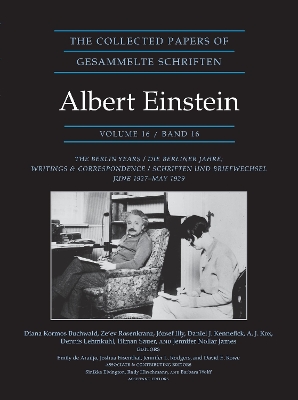Collected Papers of Albert Einstein
23 total works
The Collected Papers of Albert Einstein, Volume 16 (Documentary Edition)
by Albert Einstein
A definitive scholarly edition of the correspondence and papers of Albert Einstein
During the period covered by this volume, Einstein aims to discover whether one can derive the electron's equations of motion directly from the field equations of general relativity, and he embarks on a new approach to unified field theory founded on teleparallel geometry. On these topics, he engages in exchanges with J. Grommer, C. Lanczos, and particularly with C. H. Muntz, and corresponds with mathematicians like R. Weitzenboeck and E. Cartan.
Einstein attends what will be considered a historic 1927 Solvay Conference where the new quantum mechanics is discussed, but in fact he makes very few remarks.
In an important prelude to his eventual emigration to the United States, he is invited in September 1927 to accept a research professorship at Princeton University.
Despite the sudden onset of a severe heart ailment in 1928, followed by an almost year-long period of convalescence, Einstein maintains a sustained engagement with scientific work, correspondence, and social and political issues. He publishes many articles and interviews designed for a popular audience and continues various technical preoccupations, including publishing a patent for a novel "people's" refrigerator and being intimately involved in the design of his famous sailboat.
Einstein advocates for domestic legislative reform, gay and minority rights, European rapprochement, and conscientious objection to military service. He resigns from his positions at the Hebrew University. He also tries to avoid the fanfare marking his fiftieth birthday in March 1929 yet is "buried under a paper avalanche" from the tributes.
His hiring of Helen Dukas as his assistant, who accompanies Einstein to the end of his life, is of great significance for the ultimate preservation of his written legacy.
The Collected Papers of Albert Einstein, Volume 17 (Documentary Edition)
by Albert Einstein
A definitive scholarly edition of the correspondence and papers of Albert Einstein
This volume finds Einstein recovered and traveling again after a prolonged illness, to Paris, London, and Zurich to receive three honorary doctorates; to the Sixth Solvay Congress in Brussels and to Leyden; and to attend the Constituent Meeting of the Jewish Agency Council in Zurich and the twelfth session of the ICIC in Geneva. By the end of the volume, Einstein embarks on a transatlantic voyage for the first time in five years to spend an academic term at the California Institute of Technology in Pasadena.
Einstein’s work focuses on the teleparallel approach to unified field theory, on which he engages in intensive correspondence with Élie Cartan and begins his collaboration with Walther Mayer. He also presents popular accounts of his work, surveying the historical progression from classical to twentieth-century physics leading up to the latest developments in unified field theory. He also engages in lively exchanges on both technical and foundational issues in quantum mechanics with W. Pauli, M. Born, M. Schlick, and others.
His personal correspondence reflects eventful changes: the Einsteins realize their dream of owning a summer house outside Berlin, Einstein becomes a grandfather, his younger son Eduard commences his university studies and has his first serious mental health crisis, and his younger stepdaughter Margot gets married.
Einstein’s ties to the Zionist movement are seriously tested in the wake of the violence that erupts in British Mandate Palestine in 1929, to which he reacts with forceful calls for a genuine symbiosis between Jews and Arabs, proposing the establishment of joint administrative, economic, and social organizations. He warns that without finding “the path to honest cooperation and honest negotiations with the Arabs,” “we [Jews] have learned nothing from our two-thousand-year ordeal and deserve the fate that will befall us.”
In Germany, too, Einstein champions democracy in the face of rising support for the Nazi Party, is active on behalf of Jewish refugees, opposes the death penalty, and supports abortion rights and the decriminalization of homosexuality.
Einstein promotes pacifism more vigorously. His efforts to promote peace follow three distinct transnational avenues: disarmament, conscientious objection, and apolitical pacifism, aimed “to find practical mechanisms to restrict the nation state.”
The Collected Papers of Albert Einstein, Volume 17 (Translation Supplement)
by Albert Einstein
An English-language edition of selected correspondence and papers of Albert Einstein
A translation of selected non-English texts included in Volume 17 is available in paperback. Since this supplementary paperback includes only select portions of Volume 17, it is not recommended for purchase without the main volume.
Every document in The Collected Papers of Albert Einstein appears in the language in which it was written, and this supplementary paperback volume presents the English translations of select portions of non-English materials in Volume 17. This translation does not include notes or annotations of the documentary volume and is not intended for use without the original language documentary edition, which provides the extensive editorial commentary necessary for a full historical and scientific understanding of the documents.

